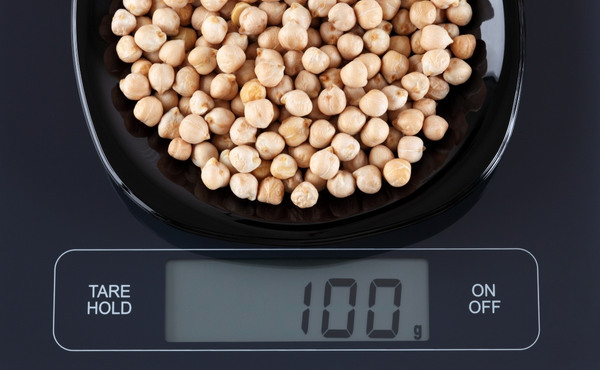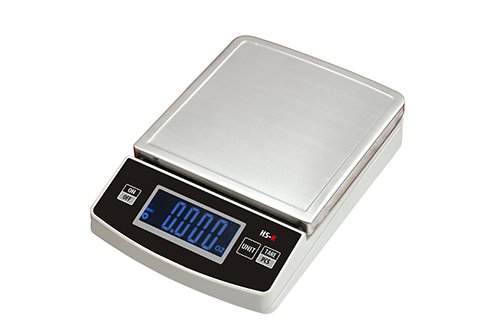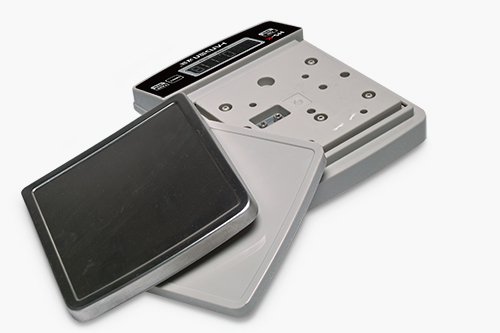
Accuracy
Precision Levels
Accuracy stands at the core of every kitchen operation. Businesses that buy wholesale kitchen scales must focus on precision to ensure consistent results. High accuracy reduces waste and improves customer trust.
Different types of scales offer various precision levels. Some scales measure down to 0.1 grams, while others provide less detailed readings. Buyers should match the precision level to their kitchen’s needs.
Precision impacts every measurement. A high precision scale ensures recipes turn out the same every time. This consistency saves money and time.
Increment Size
Increment size refers to the smallest measurement a scale can display. Smaller increments mean greater accuracy and better control over ingredients. For example, a scale with 1-gram increments suits most kitchens, but bakeries may need 0.1-gram increments.
Different types of scales come with different increment sizes. Buyers should compare models to find the best fit for their workflow. Choosing the right increment size prevents costly mistakes.
Selecting the right measurement increment ensures accuracy in every dish. Wholesale buyers who focus on increment size gain a competitive edge.
Capacity
Typical Ranges
Kitchen scales come in a wide range of capacities. Most commercial models handle between 5 kg and 30 kg. Some specialty scales can measure even larger quantities, but most kitchens find these ranges suitable.
Selecting the right capacity ensures the scales meet daily demands. Too small a scale leads to repeated weighing and wasted time. Too large a scale may reduce accuracy for small items.
Choosing the Right Size
Every kitchen has unique needs. A bakery may require scales that handle both small and large batches. A restaurant might need several scales for different stations.
Buyers should consider the largest and smallest items they weigh most often. Matching scale capacity to these needs prevents workflow interruptions. It also protects the scales from overload and extends their lifespan.
Wholesale buyers benefit from purchasing a mix of capacities. This approach covers all kitchen tasks and boosts efficiency. Investing in the right size scales reduces replacement costs and supports smooth operations.
Units & Tare Function
Measurement Units
Kitchen operations demand flexibility. Scales that offer multiple measurement units help staff work faster and reduce errors. Most commercial scales provide options like grams, ounces, pounds, and kilograms.
Switching between units allows teams to follow any recipe or portion guideline. This feature supports international menus and diverse ingredient lists. Businesses that buy wholesale benefit from this versatility.
Tare Feature
The tare function stands out as a must-have for busy kitchens. This feature lets users reset the scale to zero after placing a container on it. Staff can then measure only the contents, not the weight of bowls or trays.
Scales with a reliable tare function save time and reduce waste. Workers can add ingredients one by one, pressing tare between each addition. This process ensures accurate measurements and consistent results.
Many commercial scales offer an easy-to-use tare button. Teams should test this feature before buying. Reliable tare functions improve workflow and help maintain quality standards.
Display & Readability
Digital vs Analog
Kitchen staff need to read measurements quickly and accurately. Digital kitchen scales offer clear, easy-to-read numbers on a screen. Analog scales use a dial and pointer, which can slow down busy workers.
Digital models often provide extra features, such as backlighting or touch controls. These features help staff work faster and reduce mistakes. Analog scales may cost less, but they lack the speed and precision of digital options.
Visibility
Good visibility ensures staff can read measurements from any angle. Large, bright displays make a big difference in a fast-paced kitchen. Some scales feature high-contrast screens or bold numbers for better readability.
Scales with strong visibility features improve workflow and reduce errors. Wholesale buyers should always test display clarity before making a purchase. Clear displays lead to smoother operations and higher customer satisfaction.

Material & Cleanability
Food-Safe Materials
Every kitchen must prioritize safety. Scales made from food-safe materials protect both staff and customers. Stainless steel stands out as the best choice for commercial kitchens because it resists corrosion and does not react with food.
Plastic components should be BPA-free and certified for food contact. Some scales use glass platforms, which also provide a safe and non-porous surface. Food-safe materials help prevent contamination and support health standards.
Easy Cleaning
Busy kitchens need equipment that cleans quickly. Scales with smooth surfaces and minimal seams make cleaning simple. Removable trays or platforms allow staff to wash parts thoroughly.
Scales that resist stains and odors keep kitchens fresh. Water-resistant models allow for safe cleaning with damp cloths or mild detergents. Easy-to-clean scales reduce downtime and help maintain high hygiene standards.
Wholesale buyers should always inspect cleaning instructions before purchasing. Choosing the right scales saves time and supports a safe kitchen environment.
Power Options
Battery Life
Battery life plays a crucial role in the daily operation of kitchen scales. Commercial kitchens need scales that last through long shifts without frequent battery changes. Reliable battery performance keeps the workflow smooth and prevents unexpected downtime.
Some scales use standard AA or AAA batteries, while others feature rechargeable options. Rechargeable batteries can save money over time and reduce waste. Staff should check the estimated battery life in the product specifications before making a purchase.
Alternative Power
Some scales offer alternative power sources for added flexibility. Plug-in models connect directly to wall outlets, providing continuous power for high-volume kitchens. USB-powered scales allow charging from computers or power banks, which adds convenience in modern kitchens.
Solar-powered scales have started to appear in some markets. These models use ambient light to extend battery life and lower energy costs. Alternative power options help businesses reduce operating expenses and support sustainability goals.
Wholesale buyers should consider the kitchen layout and daily workflow when choosing power options. The right choice ensures that scales stay ready for use at all times.
Smart Features
Connectivity
Modern kitchen scales now offer advanced connectivity options. Many models feature Bluetooth or Wi-Fi, which allows them to connect to computers, tablets, or smartphones. This connection helps staff track measurements, log data, and share results instantly.
Businesses can use connected scales to monitor inventory in real time. Staff can send weight data directly to inventory management systems. This process reduces manual entry and cuts down on errors.
Integration
Seamless integration with other kitchen tools and software sets the best scales apart. Some scales work with recipe management apps or point-of-sale systems. This feature helps staff follow recipes and portion guidelines without switching devices.
Integrated scales can also support automated ordering. When inventory drops below a set level, the system can alert staff or place orders automatically. This smart feature saves time and prevents shortages.
Wholesale buyers gain a competitive edge by choosing scales with smart features. These options support smooth operations and help businesses grow.
Quality and Durability
Build Quality
Every business needs kitchen scales that deliver consistent performance. High build quality ensures that scales withstand daily use in busy kitchens. Stainless steel construction resists rust and damage, making it a top choice for commercial environments.
Buyers should check the weight and feel of the scales. Heavier models often signal better quality. Look for tight seams and solid buttons, as these features prevent dirt and moisture from entering the device.
A quick inspection can reveal a lot about quality. Examine the display and platform for any signs of weakness. Reliable scales will not wobble or shift during use.
Overload Protection
Overload protection keeps scales safe from damage when staff weigh heavy items. This feature stops the device from breaking if someone exceeds the maximum weight. Many commercial scales include a warning indicator or automatic shut-off.
Durable scales with overload protection last longer and save money. Businesses avoid costly repairs and downtime. Overload protection also helps maintain accuracy, as it prevents internal parts from bending or breaking.
Buyers should always test overload features before purchasing. Quality scales with strong protection offer peace of mind. Wholesale buyers who focus on durability gain a real advantage in the market.
Brand & Supplier
Reputation
Buyers should always research the reputation of suppliers before making a purchase. A supplier with a strong track record delivers reliable scales that meet business needs. Many businesses trust top-quality brands because they offer consistent performance and proven durability.
A good reputation signals that a supplier values customer satisfaction. Positive reviews and testimonials show that other buyers have received dependable products. Companies that supply wholesale kitchen scales often highlight their years in business and customer feedback.
Support & Warranty
Strong support and warranty policies protect a business’s investment. Reliable suppliers provide clear warranty terms for their scales. These policies cover defects and malfunctions, giving buyers peace of mind.
Responsive customer support helps resolve issues quickly. When a scale stops working, fast assistance keeps the kitchen running smoothly. Many top-quality brands offer dedicated support teams and easy-to-understand warranty coverage.
Buyers should always ask about support and warranty before finalizing a wholesale order. Choosing suppliers with strong policies ensures long-term satisfaction and reduces unexpected costs.
Price vs Value
Cost Factors
Every business wants to maximize value when buying wholesale kitchen scales. The main cost factors include the scale’s capacity, precision, and the range of weight it can handle. Higher capacity and more precise weight measurements often increase the price, but they also improve performance in a busy wholesale kitchen.
Material quality also affects cost. Stainless steel platforms last longer and resist damage from frequent weight loads. Digital displays and advanced features, such as multiple weight units or quick tare functions, can add to the price but save time in daily kitchen routines.
Buyers should compare the total cost of ownership. This includes the initial price, maintenance, and the cost of replacing scales that cannot handle the required weight. A table can help summarize key cost factors:
ROI
Return on investment matters for every wholesale kitchen. Scales that deliver accurate weight readings reduce waste and improve portion control. This accuracy leads to better food quality and higher customer satisfaction.
A reliable scale lowers replacement costs. When a scale handles the correct weight and lasts longer, the business spends less on repairs. Staff work faster with easy-to-read displays and quick tare functions, which boosts productivity.
Smart buyers look at long-term value, not just the lowest price. The right wholesale kitchen scale pays for itself by improving workflow and reducing errors in weight measurement. Choosing wisely ensures the kitchen runs smoothly and profits grow.
Buying Tips Overview
Choosing the right scale for business operations requires careful attention. Buyers need to focus on the most important factors to avoid costly mistakes. The following buying tips for wholesale kitchen scales help streamline the selection process and ensure long-term satisfaction.
Key Considerations
- Accuracy stands as the top priority. Business owners should check the precision level and increment size before making a decision.
- Capacity matters for every operation. Buyers must select a scale that matches their typical workload and product sizes.
- Durability ensures the scale will last. Commercial environments demand strong build quality and reliable performance.
- Features like tare function and multiple measurement units add convenience. These options save time and reduce errors in busy kitchens.
- Easy-to-read displays improve workflow. Digital screens often provide better visibility than analog options.
Common Mistakes
Many buyers overlook the importance of accuracy and capacity. They sometimes choose the cheapest option without considering long-term needs. This mistake can lead to frequent replacements and higher costs.
Some buyers ignore the cleaning process. Scales with complex designs or non-food-safe materials can slow down operations. Others forget to check for warranty and supplier support, which can cause problems if issues arise.
Relying on a single source for buying tips limits the decision-making process. Smart buyers gather information from multiple sources to make informed choices. Following these steps helps businesses avoid common pitfalls in the wholesale market.
